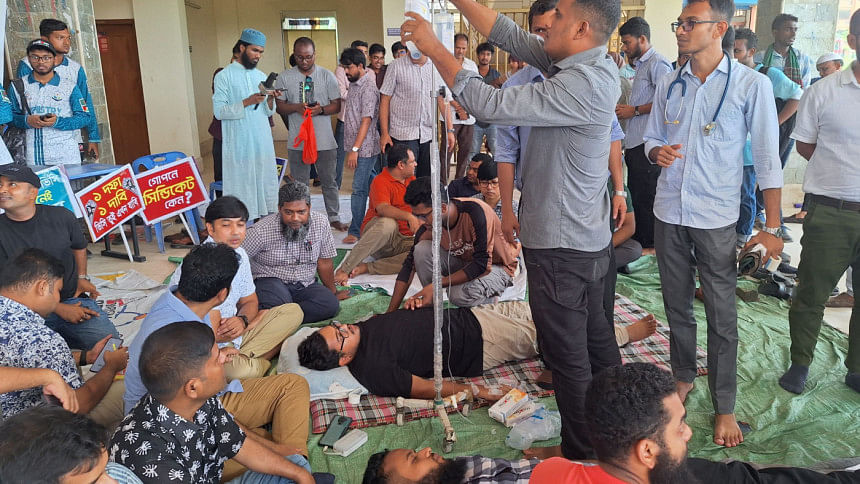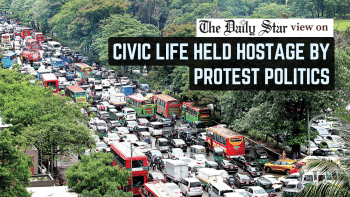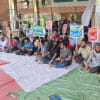In search of a vice-chancellor

The government has formed a five-member search committee to identify candidates for the three top positions of public universities. The education adviser, two members of the University Grants Commission (UGC), and two senior professors will be responsible for shortlisting names for final appointment by the chancellor of universities, also the president of the country.
Similar ideas were floated in 2003 by the Moniruzzaman Miah Education Commission, which proposed appointing the chief justice or an elected judge as the head of the selection panel. The idea was not well received, especially by the faculty of the four public universities governed by the 1973 Act, who are particularly sensitive about their autonomy. The 2006 UGC report and the National Education Policy 2010 reiterated the idea of selection panels; these were also largely ignored. Central to the formation of the panel is the objective of minimising political interference in the selection of top university managers.
One may wonder though: why now, and why did such initiatives fail before? Critics have already pointed out that the top positions at 47 public universities have already been filled by the interim government. What positive outcomes will this proposed search committee produce?
The formation of a search committee is a welcome move in that it creates an opportunity to examine the deep-seated issues plaguing the hiring process of top management in the country's higher education system. The first challenge will be to streamline the two different pathways for appointing vice-chancellors: one under the University Act 1973, and the other under the Private University Act 2010. For universities under the 1973 Act, a senate session must be held to select a panel of candidates, while others bypass this process and appoint vice-chancellors directly through recommendations from the UGC and the education ministry—or from the board of trustees, in the case of private universities. The final decision rests with the chancellor, making the process susceptible to political manipulation.
The challenge for the search committee is to reconcile these inconsistencies and establish a system that involves broader consultation, stakeholder support, or direct interviews. Vice-chancellors, ideally, must be more than competent teachers or researchers. They should be visionary administrators, balancing academic excellence with institutional governance. As heads of institutions, they must earn their colleagues' respect by demonstrating a deep understanding of the academic environment and the evolving landscape of higher education. A clear, forward-looking vision for the university should accompany their academic integrity. They must create an ecosystem where students and faculty can realise their potential. Furthermore, ideal candidates should possess the personal network and diplomatic acumen to communicate institutional needs while safeguarding the academic environment from external and political interference.
Vice-chancellors must recognise that their role entails enhancing the campus experience for students and staff alike. A safe and congenial academic atmosphere that fosters holistic development opportunities is essential. To achieve this, a vice-chancellor must exhibit strong administrative skills—managing finances, human resources, and infrastructure efficiently—while upholding the highest ethical standards. In all respects, they should ensure clear communication, transparency, and a commitment to reducing systemic inequalities.
Unfortunately, we have seen many of our vice-chancellors fail to live up to these ideals. Several have faced forcible removal, siege, or even assault. One of the key issues the search committee must consider is whether to appoint homegrown faculty to lead their respective universities or to select from a national pool of qualified academic administrators. Many vice-chancellors brought in from other institutions often lack a deep connection to the universities they are appointed to lead. This disconnect renders them vulnerable to opposition from local stakeholders who feel excluded from decision-making. When vice-chancellors are not rooted in their institutions and lack local support, their authority is inevitably weakened, leading to instability.
The situation at Barishal University is relevant to this discussion. The assault on the National University vice-chancellor, following demands for an automatic pass scheme, highlights another disturbing trend. After the July uprising, many students feel empowered and entitled. They are increasingly asserting their authority over university leadership. These acts of defiance point to a larger underlying issue: students no longer trust their leaders or are overambitious about their careers. The murder of a student leader in a park near the Dhaka University campus has raised another pressing concern: student safety. DU vice-chancellor is now facing protests for a crime committed outside the campus, with calls for his resignation. While speaking to students at one of the protests last week, he lost his temper, adding another layer to the crisis.
Given the evolving realities, the search committee could implement a transparent and functional system to nominate top officials, free from the complexities of local and short-term politics. It should also seek to reform the institutions for which they are selecting top management. Many academic leaders are unable to achieve excellence due to inherent institutional flaws. Regrettably, political motives have driven the establishment of many of our universities. A significant number of them still operate more like degree colleges. These institutions serve as political tools rather than centres of higher learning. This approach has prevented universities from maturing into autonomous, globally competitive institutions. Instead, they have become arenas for partisan conflict, frequently prioritising political considerations over academic ones.
The formation of the search committee is a step in the right direction towards comprehensive reform of university governance. I trust the committee will define the terms of reference for would-be VCs, in which political allegiances should be the least of concerns. First and foremost, we want accountability and transparency from our university administrators. Second, we want quality over quantity. If necessary, two or three universities can be merged to ensure sustainable resource management and growth of our higher education sector. Third, there should be no compromise on the rule of law. We must immediately put an end to the mob mentality of students demanding auto-passes or other undue privileges. Finally, a moratorium must be placed on party politics within universities. Career clubs can offer alternative platforms for students to exercise their freedom of thought and rights—but they should not have direct links to mainstream political parties.
The crisis in Bangladesh's higher education leadership is not merely about individual vice-chancellors or political factions. It also involves a systemic failure. The search for new leadership, if done right, can be a step towards resolving these issues.
Dr Shamsad Mortuza is professor of English at Dhaka University.
Views expressed in this article are the author's own.
Follow The Daily Star Opinion on Facebook for the latest opinions, commentaries and analyses by experts and professionals. To contribute your article or letter to The Daily Star Opinion, see our guidelines for submission.

 For all latest news, follow The Daily Star's Google News channel.
For all latest news, follow The Daily Star's Google News channel. 











Comments